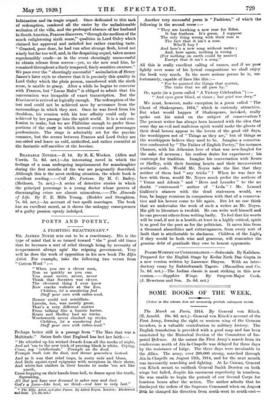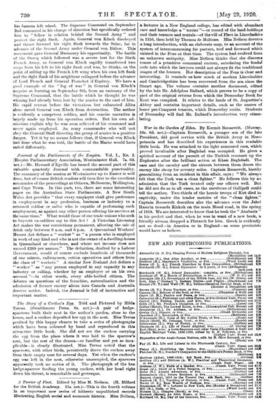SOME BOOKS OF THE WEEK.
[Notice in this column does not necessarily preclude subsequent review.
The March on Paris, 1914. By General von Kluck. (E. Arnold. 10s. 6d. net.)—General von Kluck's account of the First Army, forming the right or western wing of the German invaders, is a valuable contribution to military history. The English translation is provided with a good map and has been annotated by the Historical Section of the Committee of Im- perial Defence. At the outset the First Army's march from its rendezvous north of Aix-la-Chapelle was delayed for three days by the resistance of Liege. The three days were invaluable to the Allies. The army, over 200,000 strong, marched through Aix-la-Chapelle on August 13th, 1914, and for the next month was incessantly marching and fighting. At Le Cateau, General von Kluck meant to outflank General Smith Dorrien on both wings but failed, despite his enormous superiority in numbers. He was unable to begin the pursuit of our Second Corps for fourteen hours after the action. The author admits that he disobeyed the orders of the Supreme Command when on August 30th he changed his direction from south-west to south-east-. his famous left wheel. The Supreme. Command on, September 2nd concurred in his change of direction but specifically ordered him to "follow in echelon behind the Second Army " and protect the right flank. Again,. General von. Kluck disobeyed and thrust forward his right flank towards the Seine, far in advance of the Second Army under General von Billow. This movement gave General Maunoury his opportunity. The battle of the Oureq which followed was a severe test for the Sixth French Army, as General von Kluck rapidly transferred two corps from his left to his right flank and was, he thinks, on the point of rolling up the French left wing when his own left flank and the right flank of his neighbour collapsed before the advance of Lord French and General Franchet d'Esperey. We have a good example of the " fog of war " in General von Kluck'a surprise at learning on September 9th, from an emissary of the Supreme Command, that the battle which he thought he was whining had already been lost by the armies to the east of him. His rapid retreat before the victorious but exhausted Allies alone saved General von Kluck from destruction. The author Is evidently a competent soldier, and his concise narrative is largely made up from his operation orders. But his own ad- missions explain why he was soon relieved of his command and never again employed. An army commander who will not obey the General Staff directing the group of armies -is-a positive danger. Yet it by no means follows that, if General von Kluck had done what he was told, the battle of the Marne would have ended differently.







































 Previous page
Previous page